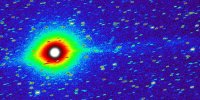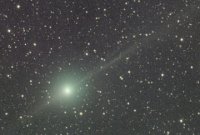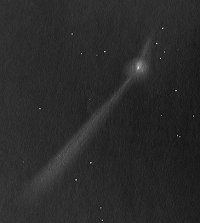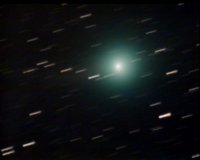| |
| |
Photographer,
Location |
Images |
Comments |
|

|
Gregg
Ruppel,
Ellisville, MO
Jan. 24, 2009 |
#1,
#2, more |
Comet
Lulin has brightened but its tail and anti-tail are quite
dim. Here's a false color image that shows the tails slightly
better than a monochrome image. |
|

|
Chris
Brennan,
Barbados
Jan. 24, 2009 |
#1 |
just
before dawn from Barbados on Jan 24. double tail noted !
TAK 180/SXV H16 |
|

|
Martin
Mc Kenna,
Maghera, Co. Derry, N. Ireland
Jan. 23, 2009 |
#1,
more |
Here's
a sketch I made of C/2007 N3 Lulin before dawn this morning
using a 8.5" F/7 reflector with 32mm 2" SWA eyepiece. My
immediate impression was that the comet was very bright.
It struck me just how healthy and active the coma looked
even at a casual glance. The coma was at least 7' in dia
with a very intense white-coloured and disk-shaped central
condensation with star-like false nucleus at centre. The
outer coma was an obvious green colour. On several occasions
I seen at least one jet within the coma pointing to the
S. The anti-tail was very faint and elusive and required
good dark adaption and averted vision. I had to move the
scope in various directions to pick out the faint details
so I'm not 100% certain about what I saw. I found the colourless
anti-tail to be at least 20' long but I suspected it to
be much longer. The gas/ion tail was much brighter and pointed
in a generally S direction. To me this tail was green and
sported a smooth profile and seemed to broaden with distance
away from the coma much like a search beam. I could easily
see the tail for a minimum of 1 degree but again I'm sure
it's much longer that this. Seeing both tails at the same
time was quite a treat! Despite the very poor quality of
my binoculars I was still able to find the comet easily.
I also tried very carefully to detect it with the naked
eye but I just couldn't convince myself that it was visible.
However, I suspect that with excellent sky conditions the
first naked eye observations will be reported very soon.
As for a magnitude estimate, I didn't really make one because
I was trying to ferret out the details within the tail but
based on the ease of which I could see the coma in the scope
I would say approx mag +6.5, give or take a mag or so on
either side. I think this comet could very well put on a
good show in Feb! |
|

|
Francisco A. Rodriguez,
Observatorio Montaņa Cabreja (MPC J45)
Vega de San Mateo. Gran Canaria. Canary Islands
Jan. 25, 2009 |
#1,
more |
8" GSO Reflector F/4 + Orion ATLAS Mount
CCD StarShoot V1 Color. 48 x 60s
|
more
images:
from
Michael Rosolina of Friars Hill, West Virginia; from
Günther Strauch of Borken, NRW, Germany; from
Jim Saueressig of Burlington, Kansas; from
Msgr. Ron Royer of Springville, California; from
Dennis Put of Brielle, Zuid-Holland, Netherlands |
|




